| Srl | Item |
| 1 |
ID:
072790
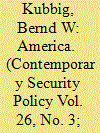

|
|
|
|
|
| Publication |
2005.
|
| Summary/Abstract |
This article traces the development of the post-Cold War American discourse on ballistic missile defences from its arms control supportive stance during the first Clinton administration to the abandonment of the ABM Treaty in 2002. It shows how military primacy and the absence of a peer competitor enabled conservative opponents of the ABM Treaty to change the discourse on National Missile Defense. Especially after the landslide victory of the Republicans in the 1994 congressional elections, national missile defence became politically driven, reducing the influence of more moderate forces on the debate. The 1998 Rumsfeld Report and the missile test by North Korea in the same year led to the Senate vote in 1999 to go ahead with a national missile shield. Neoconservatives dominated the agenda and the ABM Treaty was doomed. The article concludes with a review of the current missile defence testing programme. It suggests that contrary to the expectation of realizing post-Cold War primacy, the limits of technology have put more formidable shackles on American unilateralism than the constraints of the ABM Treaty Neoconservatives thought to escape from.
|
|
|
|
|
|
|
|
|
|
|
|
|
|
|
|
| 2 |
ID:
073058
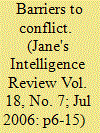

|
|
|
| 3 |
ID:
075400
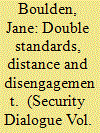

|
|
|
|
|
| Publication |
2006.
|
| Summary/Abstract |
The article examines three specific aspects of military operations authorized by the UN Security Council in the post-Cold War period. The trends examined respond to the following questions: Who chooses what gets on the Security Council's agenda? Who implements actions authorized by the Security Council? And what is it that they are doing? The answers reveal that it is the P-5 who control both what gets on the Security Council agenda and, importantly, what does not. In terms of carrying out Security Council activity, the post-Cold War period has generated a division of labour whereby developing states are the main providers of troops for blue-helmeted UN operations, while developed states contribute to coalition operations in their own regions and/or when their own vital interests are at stake. The main activity is post-conflict or what might be termed pre-post-conflict operations. Taken together, these trends characterize a Council that can be described as distant and disengaged, at least for some conflicts in some parts of the world. Using Claude's idea of collective legitimization, the article argues that these trends suggest that greater consideration needs to be given to how to recoup Council legitimacy, not just how to increase its representative nature, when debating UN reform. While both representativeness and legitimacy are desirable, the pursuit of one without considering the repercussions to the other may ultimately undermine the objectives of reform.
|
|
|
|
|
|
|
|
|
|
|
|
|
|
|
|
| 4 |
ID:
005975
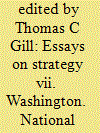

|
|
|
|
|
| Publication |
Washington, National Defence Univ. Pr., 1990.
|
| Description |
230p.
|
|
|
|
|
|
|
|
|
|
|
|
Copies: C:1/I:0,R:0,Q:0
Circulation
| Accession# | Call# | Current Location | Status | Policy | Location |
| 037545 | 355.4/GIL 037545 | Main | Withdrawn | General | |
|
|
|
|
| 5 |
ID:
071281
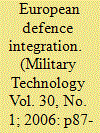

|
|
|
| 6 |
ID:
004448
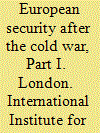

|
|
|
|
|
| Publication |
London, International Institute for Strategic Studies, 1994.
|
| Description |
104p.
|
| Series |
Adelphi Paper; 284
|
| Standard Number |
1-85753-130-2
|
|
|
|
|
|
|
|
|
|
|
|
Copies: C:1/I:0,R:0,Q:0
Circulation
| Accession# | Call# | Current Location | Status | Policy | Location |
| 035272 | R 355.03304/EUR 035272 | Main | On Shelf | General | |
|
|
|
|
| 7 |
ID:
075244
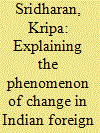

|
|
|
|
|
| Publication |
2006.
|
| Summary/Abstract |
This paper seeks to explain the conditions under which governments decide to change the course of their foreign policy using the National Democratic Alliance regime of India as a case study. The foreign policy change literature is rich in insights about the sources, conditions and consequences of change. The relevant findings from the literature are used to analyse the nature and degree of change in Indian foreign policy under the National Democratic Alliance government in two areas: nuclear policy and Indo-US relations. While it is generally conceded that India changed the course and content of its policy in the late 1990s, the reasons and impact of the change are still a matter of debate. There is also no agreement on whether India has just made some adjustment changes or a fundamental shift in its orientation. This paper uses relevant indicators to establish the nature, level and degree of change in India's policy, and examines whether policy alterations were merely reactive, incremental and ad hoc, or whether they represented a conscious design comprising clear objectives and supportive strategies.
|
|
|
|
|
|
|
|
|
|
|
|
|
|
|
|
| 8 |
ID:
074075
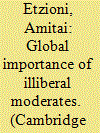

|
|
|
|
|
| Publication |
2006.
|
| Summary/Abstract |
In contrast to the claim that the most significant fault line in contemporary global affairs is between the civilisation of the West and all others, this essay argues that the schism between those who advance their values through violence and those who rely on persuasion, both of which are present in all civilisations, is the greatest source of conflict in the post-Cold-War era. Moderates come in many stripes: some are liberal, such as Reform Jews and Social Democrats, while most others are illiberal, including many Muslim religious leaders. All moderates, however, share in common a principled rejection of violence. Polls and reports from around the world bear out that a conviction of the value of persuasion over coercion does not depend on faith in democracy or secularism. The West should ally itself with such moderates, no matter how liberal or illiberal their orientation.
|
|
|
|
|
|
|
|
|
|
|
|
|
|
|
|
| 9 |
ID:
074907
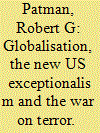

|
|
|
|
|
| Publication |
2006.
|
| Summary/Abstract |
This article focuses on the tensions between a new exclusive US exceptionalism after 9/11 and a globalised security environment. The terrorist attacks in Washington and New York revealed that even the world's only superpower is vulnerable to the type of transnational violence that had blighted other countries during the post-cold war era. Yet these events, at least in the short term, have served to intensify the ‘distinctive American internationalism’ of the Bush administration. This trend culminated in the USA bypassing the authority of the UN Security Council and leading an invasion of Iraq in March 2003. Nevertheless, there are growing signs that this new American exceptionalism has become a serious impediment to effectively prosecuting the war on terror. In the era of globalisation it is the support of other nations and multilateral institutions that offers the best hope of ensuring that the USA lives in a more secure world. Without moving to a more inclusive form of exceptionalism, Washington will struggle to sustain the level of international support that it needs to prevail in the current struggle against terrorism.
|
|
|
|
|
|
|
|
|
|
|
|
|
|
|
|
| 10 |
ID:
075103
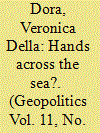

|
|
|
| 11 |
ID:
145891
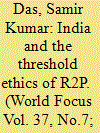

|
|
|
|
|
| Summary/Abstract |
India’s foreign policy in the post-Cold War period has become a subject of one of the most acrimonious debates in her recent past history. While it is often denigrated as ‘firefighting’, ‘ad hocism’ and ‘drift’, many other commentators propose to interpret it as one driven by realpolitik interests paying scant regard to her ideological and ethical commitments. Never before in her history has Indian foreign policy faced such an ethical crisis as it is facing now.
|
|
|
|
|
|
|
|
|
|
|
|
|
|
|
|
| 12 |
ID:
073699
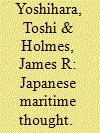

|
|
|
|
|
| Publication |
2006.
|
| Summary/Abstract |
Postwar Japan is a case study in strategy making without a larger theoretical framework. Imperial Japan's attachment to Mahanian strategic theory did not outlive World War II. Japan's break with Mahanian thought, however, is occurring at a moment in history when China's ambitions could usher in a new age of Mahan
|
|
|
|
|
|
|
|
|
|
|
|
|
|
|
|
| 13 |
ID:
073565
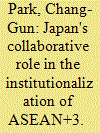

|
|
|
|
|
| Publication |
2006.
|
| Summary/Abstract |
This article examines the significance of Japan's collaborative role in promoting regional integration in post-cold war East Asia, focusing on the institutionalization of the ASEAN+3 (the Association of Southeast Asian Nations+ China, Japan, and South Korea) from 1999 to 2005. This empirical case is essential to explain the main framework for the diffusion of regional institutionalization, which draws attention to Japan's collaborative role in the development of an effective institutional arrangement in East Asia. The ASEAN+3 process is the dominant engine for the formation of an East Asian Integration Regime (EAIR). Since the Joint Statement on East Asian Cooperation in 1999, Japan has taken advantage of changing circumstances to carve out a collaborative role in promoting the institutionalization of ASEAN+3. Seen in this light, the discussion seeks to explain Japan's regional projects in accordance with the rules and decision-making procedures of that group.
|
|
|
|
|
|
|
|
|
|
|
|
|
|
|
|
| 14 |
ID:
133902
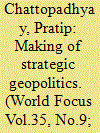

|
|
|
|
|
| Publication |
2014.
|
| Summary/Abstract |
Geopolitics as a subject has a trajectory from 'imperialist geopolitics' to 'new geopolitics' to 'critical geopolitics'. Contextualising Indo-Bangladesh relations since the post cold war period , particularly with the sensiticity of 'Gujral Doctrine' of 1996 within this 'geopolitical tradition', the paper shows that following Gujral, the NDA and UPA government have tried to project its benevolent image in its policy to Bangladesh, mostly in an one-way flow of assistance and aid, but badly wanting an assurance of 'zero-tolerance' to anti-Indian terrorist training camps in Bangladesh's soil.
|
|
|
|
|
|
|
|
|
|
|
|
|
|
|
|
| 15 |
ID:
074078
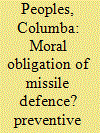

|
|
|
|
|
| Publication |
2006.
|
| Summary/Abstract |
This article aims to assess the moral arguments that have been propounded for missile defence in the post-Cold-War era and to evaluate how these relate to those made for the 'pre-emptive' use of military force. Specific attention is paid to the argument that contemporary missile defence constitutes a form of moral obligation for the United States, a position explicitly advocated by just war theorist James Turner Johnson. Drawing on critiques of similar arguments made in the 1980s, the assumptions of this position are critically assessed. Finally, the article asserts that the general reconfiguration of imminent threats in recent US security strategy gives sustenance to the moral argumentation for missile defence as much as it does the anticipatory use of force more broadly understood, indicating how the two overlap and intersect in this regard.
|
|
|
|
|
|
|
|
|
|
|
|
|
|
|
|
| 16 |
ID:
070053
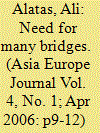

|
|
|
| 17 |
ID:
073536
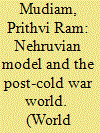

|
|
|
|
|
| Publication |
2006.
|
| Summary/Abstract |
India's socio-cultural heritage includes the principles and values of plurality, respect for diversity, tolerance and compromise, which are highly relevant to the global community as a whole while being largely shared by other Asian peoples. As Prithvi Ram Mudiam points out Nehru's theory of international relations enshrines these principles, adapting them to the modern politico-economic context and it is, as such, very appropriate for building a new Asian order.
|
|
|
|
|
|
|
|
|
|
|
|
|
|
|
|
| 18 |
ID:
074549
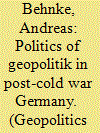

|
|
|
| 19 |
ID:
074407
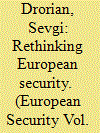

|
|
|
|
|
| Publication |
2005.
|
| Summary/Abstract |
Security agendas in Europe have gone through some striking modifications over the last couple of decades, reflecting changes in both the nature and the scope of post-Cold War security concerns. While the traditional security concerns have not completely disappeared, new sources of insecurity and instability have emerged out of the post-Cold War politico-strategic environment in Europe's peripheries. Turkey sits at the nexus of this hitherto marginalized theatre of risks and challenges. Thus, while investigating this new and broader security environment for Europe and then locating Turkey's role and place in such milieu, this article argues that Turkey has a critical role to play in this endeavour of achieving security and stability in both Europe and its surrounding regions.
|
|
|
|
|
|
|
|
|
|
|
|
|
|
|
|
| 20 |
ID:
004724
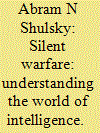

|
|
|
|
|
| Edition |
2nd Ed.
|
| Publication |
Brassey, 1993.
|
| Description |
xvii,295p.
|
| Standard Number |
0-02-881025-2
|
|
|
|
|
|
|
|
|
|
|
|
Copies: C:1/I:0,R:0,Q:0
Circulation
| Accession# | Call# | Current Location | Status | Policy | Location |
| 035584 | 327.12/SHU 035584 | Main | On Shelf | General | |
|
|
|
|